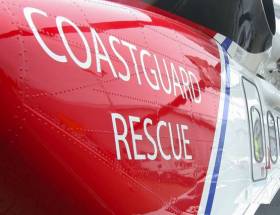Displaying items by tag: Iúda Naofa
Marine Notice: Hi-Line Protocols For Helicopter SAR Assistance
#MarineNotice - The latest Marine Notice from the Department of Transport, Tourism and Sport (DTTAS) details the proper hi-line protocols when receiving assistance from a search and rescue helicopter.
The notice follows the findings of last year’s MCIB report into the sinking of the fishing trawler Iúda Naofa off Scotland in January 2015.
As previously reported on Afloat.ie, it was determined that the crew of the trawler lacked knowhow regarding the use of hi-line, which meant they were unable to release an emergency pump dropped to the vessel on a standard clasp from a UK coastguard helicopter.
Full details are included of Marine Notice No 3 of 2017, a PDF of which is available to read or download HERE.
Report On Trawler Sinking Prompts Call For Safety Basics On Emergency Pumps, Helicopter Rescues
#MCIB - Protocols for SAR helicopter rescues and the use of emergency portable pumps should be included in safety training for fishing vessels.
Those were among the recommendations from the Marine Casualty Investigation Board's (MCIB) report on the sinking of the trawler Iúda Naofa off Scotland a year ago.
As previously reported on Afloat.ie, the Aran Islands registered trawler sank suddenly off the Outer Hebrides on 20 January 2015 after it began taking on water.
The boat's five crew were rescued immediately by an accompanying vessel and the UK coastguard, and none required medical attention, according to the MCIB.
But the board's report into the incident highlighted the lack of knowhow regarding hi-line protocols for helicopter operations among the crew, with only one fisherman on board having any prior knowledge.
As a result the crew were unable to release the emergency pump dropped from the helicopter from its standard clasp, nor determine how to operate it despite the instructions being included – though in this particular situation the flooding was too great for the pump to be of use.
The MCIB was unable to determine the cause of the water ingress without physical evidence from the trawler, which could not be recovered.
It was noted that the vessel had adequate stability for normal working conditions, and that the crew made every effort to save the vessel – but were hampered by flooding in the compartment with the pumps and generators, which rendered them useless.
Also noted was that the while the crew were not all wearing lifejackets or fully zipped up in survival suits, after expressing difficulty working on rescuing their boat with them on, they evacuated the vessel without panic and looked after each other.
The release of the report coincides with a new campaign by Bord Iascaigh Mhara (BIM) to encourage all in the fishing industry to wear personal flotation devices – or PFDs – where appropriate, according to The Irish Times.
BIM's statistics show that more than half of all fishermen in Ireland do not wear a lifejacket or PFD while at sea, despite the availability of free safety gear on subsidised training courses.
It's also despite 36% of fishermen reporting that the know of a colleague who has died at sea.
The Irish Times has much more on the story HERE.





























































